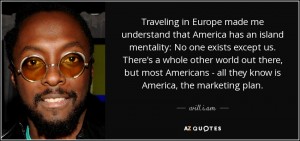
No Man, Woman or Child Is an Island
March 12th, 2017
I was inspired to write this little piece by a Mark Twain quote that I posted on my Facebook page:
Broad, wholesome, charitable views of men and things cannot be acquired by vegetating in one little corner of the earth all one’s lifetime.
Someone commented that people are still remarkably insular, despite being one big “global village” these days, more connected than ever before. Of course, insular does not refer to the physical, but to the mental. It’s a mindset, that of someone who lives on an island. So, Jamaicans for example must be particularly insular, as well as other Caribbean islanders. Is this really so? Or is it that we get “antsy” and claustrophobic sometimes, anxious to get away from it all? Or is it just me that suffers from “cabin fever”?
I just finished reading a book, which I shall be reviewing shortly, that seeks to find a “common Caribbean culture.” The author traipsed through the islands (not mainland Caribbean) but I don’t think he found a common culture at all. What he found was that the people living on each island were remarkably nationalistic: What did it mean to be Cuban, or Dominican, or Barbadian, and so on. So much for “one Caribbean”?
But the issue of insularity is not simply about being a bit patriotic. It’s about a closed mind. The German translation is Engstirnigkeit, which literally translated means “narrow forehead-ness.” Why should I be interested in Peruvian textile-making? Why should I care what happens to all those refugees? Says Insular Man or Woman. We could be forgiven if we were living back in the 19th century, when our horizons were very much narrower – and unbearably narrow for those living in slavery. In the 21st century, though, where everything is much more connected than we perhaps think it is, this is a dangerous way of thinking.

The right-wing politician Nigel Farage, who believes in Brexit, is an example of an island mentality – which one might suggest has always been a British tendency, under the surface.
There are islands within islands. For example, in inner cities there still exist pockets where if you cross the road you are in a different “territory.” Some streets are called “Top…” and “Bottom…” Street. So, of course, you don’t cross the road. You “hold your corner,” because the other corner is occupied by the “other side,” human beings just like you, with families, trying to survive. Another kind of island within an island are the numerous tiny divisions, all over the island, according to class. It’s not only noticeable in the urban areas – although poverty is deeper and more widespread in rural areas. You turn off the main road, and find yourself in a zinc-fenced “informal” community. You turn off the road a little further down, and there are nicely painted homes with neat gardens. These are islands too – zones, if you like. Zones of comfort for those who live in them, often within striking distance of each other, but worlds apart.
Well, the same thing works with the mental islands. In our brave new 21st century world, “groupthink” (a term that makes me shudder) is alive and well, even with Orwell’s year of Nineteen Eighty-Four well behind us now (in the book, Orwell called a similar concept “newspeak.”) In fact, the term was coined just two or three years after Nineteen Eighty-Four was published in 1949. Again, like a cozy corner in the physical sense, groupthink is comfortable. You actually don’t have to think too much; just parrot each other’s words, with small variations. Not too demanding, and basically lazy. If someone comes along who doesn’t think like the group, he/she is rejected. It’s a bit like those games we used to play at school, where two or three of us would make up a peculiar language that only we could understand – and laugh when someone outside our group was baffled by it. It was most satisfying, actually, because we felt superior.
In his quote, Mr. Twain is suggesting that “vegetating in one little corner” also makes you miserable and unkind. Insularity breeds intolerance and fosters self-satisfied complacency. Perhaps, the smaller the corner the more complacent you get. It must be human nature. It’s why we talk about the “small-island mentality,” petty and twisted in on itself.
We need to get out and explore the world, don’t we? And I don’t mean on National Geographic.
There are still too many narrow foreheads around.
Tags: 1984, Caribbean, George Orwell, groupthink, islands, Jamaica, Mark Twain, Nineteen Eighty-Four, social media, travel
The Gleaner reserves the right not to publish comments that may be deemed libelous, derogatory or indecent.
To respond to The Gleaner please use the feedback form.
- We Are the Zoomers
- Living Online with Humans and Birds: NAOC 2020
- Human Trafficking and the Problem of Public Education
- Down Memory Lane
- Are We Ready to Recover from COVID-19?
- Road Safety Matters: Is Your Vehicle Safe?
- Sexual Harassment, Me Too, and the Minister’s Disturbing Giggle
- The Vulnerable Senior Citizens, Private Care Homes and COVID-19
- A Muddle Over Masks
- Here is Something Life-Saving You Can Do: Give Blood!




